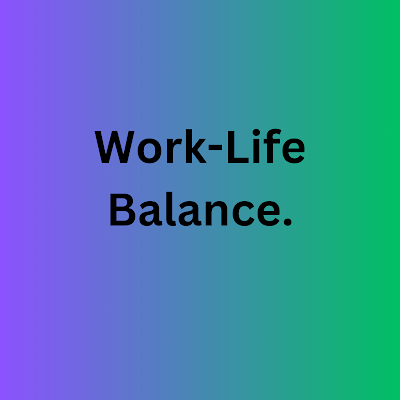Here are 12 tips on how to improve your work-life balance.
However, two important everyday notions that are relevant to each of us lie at the heart of a good work-life balance definition. They are daily Achievement and Enjoyment, ideals that are almost deceptively simple.
Achievement and enjoyment are the front and back sides of the value coin in life. One cannot exist without the other, any more than a coin can exist with simply one side. Trying to live a one-sided life explains why so many "successful" individuals are unhappy, or are not as happy as they could be.
You cannot get the most out of life unless you have both Achievement and Enjoyment. Avoiding the "As Soon As Trap" by focusing on Achievement and Enjoyment every day of your life.
Prioritizing your career and personal life in today's hectic world can be difficult. However, research shows that a poor work-life balance can lead to unhealthy levels of stress, unhappiness, and even decreased productivity.
We are never distant from our employment thanks to technological advances. Work can continue on around the clock with e-mail on our phones and cloud computing providing the network directly to the iPad in the kitchen—but it probably shouldn't.
Balance between work and life can seem unattainable these days. The availability of workers is increased by technology. Longer hours are encouraged by concerns about job loss. In fact, a Harvard Business School survey found that a staggering 94% of working professionals claimed they worked more than 50 hours a week and over half said they worked more than 65 hours a week.
Every person has a distinct definition of work-life balance, but generally speaking, it refers to the working arrangements and policies that help employees balance work and other facets of their lives. These rules can also be advantageous to employers since they can foster the growth of a more devoted and effective workforce.
These are some easy measures needed towards the achievement of an effective work-life balance;
1.Simplify: Learn to say no when you have to take time off, you don’t need to impress anyone. Remember no one is indispensable, you will be replaced immediately you are out of that job. You also need a lot of time off the job to be at home to listen to some music or some other activity of interest. Don’t engage in any other activity, it is time to rest. Make time to chill with the family, it also becomes a very nice time to re-unite with the family and friends.
2.De - Stress: Both the mind and the body must be relaxed. Relaxation is all about taking your mind off the difficulties of everyday life. Anything that achieves this can be beneficial in making you feel peaceful and at ease. One can meditate, listen to music, massage, and so forth.
3.Share the Load: Make sure to divide household activities such as dusting, sweeping, gardening, and so on. "Rather than doing their fishing for them, teach them how to fish." But, at work, delegate and ask others to hold the fort until you return.
4.Slow down: Avoid getting pulled in numerous directions, give your business top priority, and guarantee that all of your clients are satisfied. Take things one step at a time and try not to overwhelm yourself with too much effort. To accomplish our goals, we must find innovative and efficient solutions.
5.Exercise and take care of your health: We make time for the important things in life even when we're busy. We eat. We visit the restroom. We snooze. And yet, when our schedules get busy, one of our most important needs—exercise—is frequently the first to go. It helps lift your mood and can even serve a one-two punch by also putting you in a meditative state, according to the Mayo Clinic. Let’s learn to go for regular walk, go do yoga or gym, take up sports, eat well balanced food and most importantly please SLEEP.
6.Make time for leave holidays: The labour law clearly requires that every employee takes his/her leave so they could have rest. All line/HR managers should ensure strict compliance of this provision. A proper leave administration should be monitored from a central point. Remember leave encashment is illegal.
7.Employees Day out: All organizations should institutionalize an annual employee’s day out for its workers. Employees should be allowed to bring their families together to de-stress and have fun. This fun games and interesting activities helps create a stronger bond amongst them. It encourages a sense of belonging into a larger family.
8.Think about retirement: We all need interests we can fall back on. We all need something we can fall back on that isn’t work.” The Mental Health Foundation reckons that overworked people should try to reduce stress through exercise, relaxation or hobbies. We should as well carry on working in a part-time capacity, which I think is a good thing, but you will need other interests in life when work becomes less important. It is advisable to use the last 10 to 15 years of your career life planning how you would live your life when you go on retirement.
9.Work smarter not harder: Allowing yourself a certain amount of time per task – and trying not to get caught up in less productive activities, such as unstructured meetings that tend to take up lots of time.” We’ve all been there, wishing we weren’t stuck in the same room as a bunch of fatuous blowhards.
10.Leave work at work: Imagine you’re just about to leave your workplace, possibly for cocktails and then at the same time you wish to carry some work home so you could attend to it at home. Try as much as possible to leave work in the office and have a social life. Make that conscious effort not to carry work home.
11.Forget about perfection: The injunction to put work away for the day sounds fine, but hold on. It’s surely not as simple as that. As you leave work, you realize you haven’t done something as well as you could. You turn on your heel and go back to do it right. Is that so very wrong? “. Sometimes, if you’re overworked, you need to explicitly tell yourself that what you’ve done may not be perfect, but it is good enough.
12.Make ’em wait: One way to avoid being incessantly available is to make it clear to your colleagues that you will reply to emails within 24 or 48 hours. “As long as you’re reliable about replying in the end, it’s surprising how little this bothers people. You need to make it clear that you’re not endlessly available for work queries outside working hours. Admittedly, that’s easier said than done.
Work-life balance has immense benefits to both the employer and employee; let’s consider the below points; to the employer;
1. Increase in productivity, accountability and commitment
2. Better teamwork and communication
3. Improved morale
4. Less negative organizational stress
Also to the employee;
1. More value and balance in your life
2. Understanding your best work life balance
3. Increased productivity
4. Better relationship both on and off the job
5. Reduced Stress
But for a very successful work-life balance, the employer must put in the below measure to ensure the necessary impact;
• Job delegation
• Worker adjustment programs
• Part-time work
• Job Rotation/Work sharing
• Work from home
• Child care facilities/ Elder Care
• Gym subsidies
• Telecommuting
• Vacation
• Social activities
If we can execute just approximately 40% of the above strategies, we will have a completely stress-free working environment, which will reflect in productivity. The added stress of a never-ending workday is harmful. It can harm relationships, health, and happiness in general. Always remember that we work to live, not to die.




Comments
Post a Comment